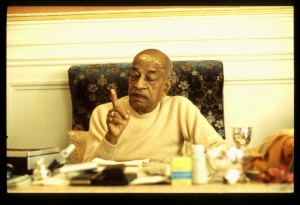CC Madhya 7.27: Difference between revisions
m (1 revision(s)) |
No edit summary |
||
| Line 1: | Line 1: | ||
{{ | [[Category:Sri Caitanya-caritamrta - Madhya-lila Chapter 07|C027]] | ||
<div style="float:left">'''[[Sri Caitanya-caritamrta|Śrī Caitanya-caritāmṛta]] - [[CC Madhya|Madhya-līlā]] - [[CC Madhya 7|Chapter 7: The Lord Begins His Tour of South India]]'''</div> | |||
<div style="float:right">[[File:Go-previous.png|link=CC Madhya 7.26|Madhya-līlā 7.26]] '''[[CC Madhya 7.26|Madhya-līlā 7.26]] - [[CC Madhya 7.28|Madhya-līlā 7.28]]''' [[File:Go-next.png|link=CC Madhya 7.28|Madhya-līlā 7.28]]</div> | |||
{{CompareVersions|CC|Madhya 7.27|CC 1975|CC 1996}} | |||
{{RandomImage}} | |||
==== TEXT 27 ==== | ==== TEXT 27 ==== | ||
<div | <div class="verse"> | ||
lokāpekṣā nāhi iṅhāra kṛṣṇa-kṛpā haite | :lokāpekṣā nāhi iṅhāra kṛṣṇa-kṛpā haite | ||
āmi lokāpekṣā kabhu nā pāri chāḍite | :āmi lokāpekṣā kabhu nā pāri chāḍite | ||
</div> | </div> | ||
| Line 12: | Line 16: | ||
==== SYNONYMS ==== | ==== SYNONYMS ==== | ||
<div | <div class="synonyms"> | ||
loka- | ''loka-apekṣā''—care for society; ''nāhi''—there is none; ''iṅhāra''—of Dāmodara; ''kṛṣṇa-kṛpā''—the mercy of the Lord; ''haite''—from; ''āmi''—I; ''loka-apekṣā''—dependence on public opinion; ''kabhu''—at any time; ''nā''—not; ''pāri''—able; ''chāḍite''—to give up, | ||
</div> | </div> | ||
| Line 19: | Line 23: | ||
==== TRANSLATION ==== | ==== TRANSLATION ==== | ||
<div | <div class="translation"> | ||
“Dāmodara Paṇḍita and others are more advanced in receiving the mercy of Lord Kṛṣṇa; therefore they are independent of public opinion. As such, they want Me to enjoy sense gratification, even though it be unethical. But since I am a poor sannyāsī, I cannot abandon the duties of the renounced order, and therefore I follow them strictly. | “Dāmodara Paṇḍita and others are more advanced in receiving the mercy of Lord Kṛṣṇa; therefore they are independent of public opinion. As such, they want Me to enjoy sense gratification, even though it be unethical. But since I am a poor sannyāsī, I cannot abandon the duties of the renounced order, and therefore I follow them strictly. | ||
</div> | </div> | ||
| Line 26: | Line 30: | ||
==== PURPORT ==== | ==== PURPORT ==== | ||
<div | <div class="purport"> | ||
A brahmacārī is supposed to assist a sannyāsī; therefore a brahmacārī should not try to instruct a sannyāsī. That is the etiquette. Consequently Dāmodara should not have advised Caitanya Mahāprabhu of His duty. | A ''brahmacārī'' is supposed to assist a ''sannyāsī''; therefore a ''brahmacārī'' should not try to instruct a ''sannyāsī''. That is the etiquette. Consequently Dāmodara should not have advised Caitanya Mahāprabhu of His duty. | ||
</div> | </div> | ||
__NOTOC__ | |||
<div style="float:right; clear:both;">[[File:Go-previous.png|link=CC Madhya 7.26|Madhya-līlā 7.26]] '''[[CC Madhya 7.26|Madhya-līlā 7.26]] - [[CC Madhya 7.28|Madhya-līlā 7.28]]''' [[File:Go-next.png|link=CC Madhya 7.28|Madhya-līlā 7.28]]</div> | |||
__NOTOC__ | |||
__NOEDITSECTION__ | |||
Revision as of 05:06, 31 July 2021

A.C. Bhaktivedanta Swami Prabhupada
TEXT 27
- lokāpekṣā nāhi iṅhāra kṛṣṇa-kṛpā haite
- āmi lokāpekṣā kabhu nā pāri chāḍite
SYNONYMS
loka-apekṣā—care for society; nāhi—there is none; iṅhāra—of Dāmodara; kṛṣṇa-kṛpā—the mercy of the Lord; haite—from; āmi—I; loka-apekṣā—dependence on public opinion; kabhu—at any time; nā—not; pāri—able; chāḍite—to give up,
TRANSLATION
“Dāmodara Paṇḍita and others are more advanced in receiving the mercy of Lord Kṛṣṇa; therefore they are independent of public opinion. As such, they want Me to enjoy sense gratification, even though it be unethical. But since I am a poor sannyāsī, I cannot abandon the duties of the renounced order, and therefore I follow them strictly.
PURPORT
A brahmacārī is supposed to assist a sannyāsī; therefore a brahmacārī should not try to instruct a sannyāsī. That is the etiquette. Consequently Dāmodara should not have advised Caitanya Mahāprabhu of His duty.